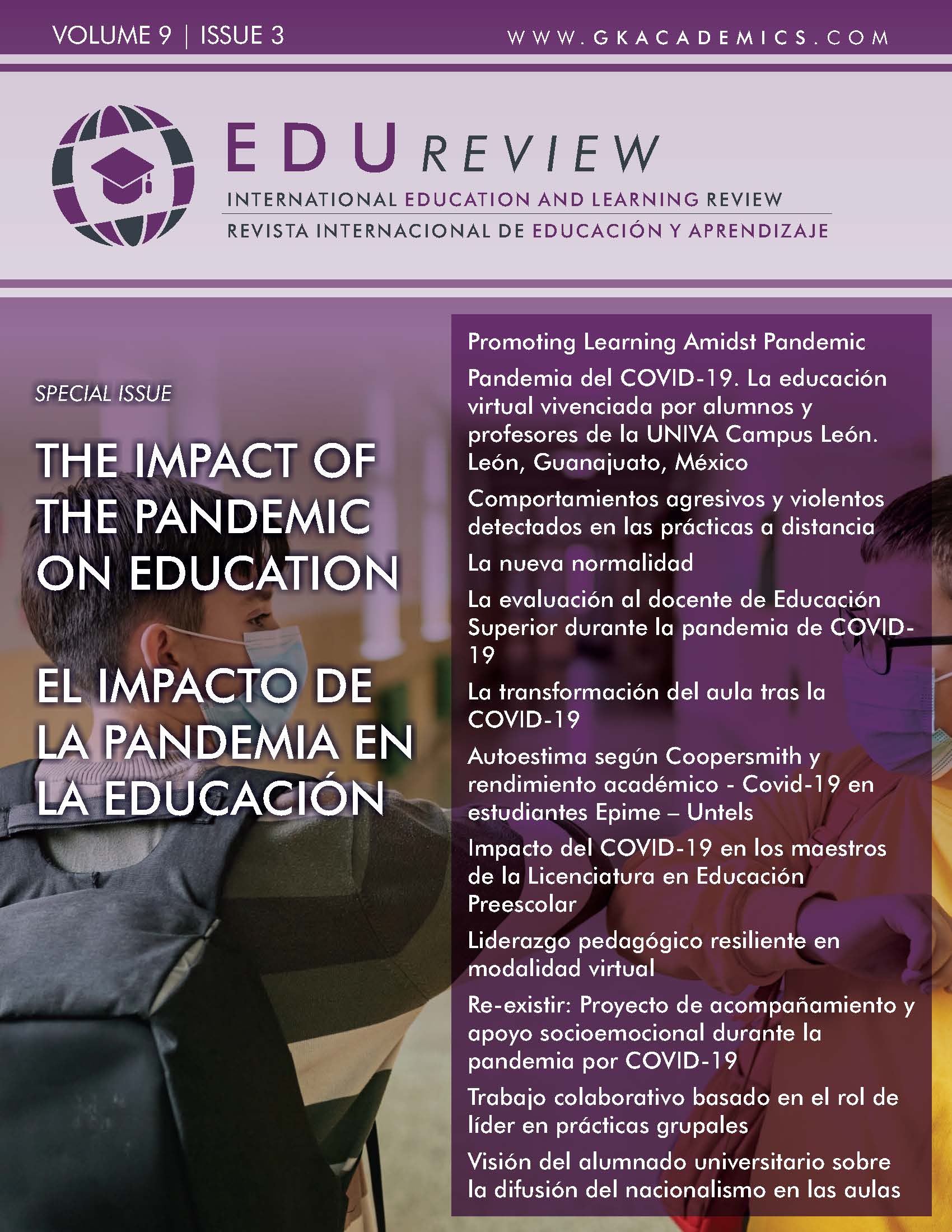The collaborative method based on the role of leader in the group practices
DOI:
https://doi.org/10.37467/gka-revedu.v9.2986Keywords:
Collaborative method, Leadership, Energy Engineering DegreeAbstract
The development of experimental courses based on the preparation of group reports collaboratively, implies a great workload for the students. The proposed methodology, which consists of assigning a group leader in each experimental session, led a slight improvement in the marks of the practices with a greater difficulty. The incidents or delays in the delivery of the reports were reduced, thus perceiving a notable improvement. Therefore, this methodology, positively valued by students, requires that all the group members communicate with the teachers and take responsibility for the delivery of the reports in a satisfactory manner.
Downloads
Global Statistics ℹ️
|
739
Views
|
339
Downloads
|
|
1078
Total
|
|
References
Alonso, M. I. y Cuéllar, A. I. (2010). ¿Cómo afrontar la evaluación del aprendizaje colaborativo? Una propuesta valorando el proceso, el contenido y el producto de la actividad grupal. Revista general de información y documentación, 20, 221–241.
Álvarez Álvarez, A. (2012). Análisis de la motivación en un contexto 2.0 de trabajo colaborativo. Vivat Academia, 0(117E), 958.
Cabero-Almenara, J. (2003). Principios pedagógicos, psicológicos y sociológicos del trabajo colaborativo: su proyección en la telenseñanza. https://www.semanticscholar.org/paper/ccaf5418a7494ced36443c97a0385b9eeead13fe
Cabero-Almenara, J., Del Prete, A. y Arancibia Muñoz, M. L. (2019). Percepciones de estudiantes universitarios chilenos sobre uso de redes sociales y trabajo colaborativo. RIED Revista Iberoamericana de Educación a Distancia, 22(2), 35.
Cotán Fernández, A., Martínez Valderrey, V., García Lázaro, I., Gil-Mediavilla, M. y Gallardo-López, J. A. (2020). El trabajo colaborativo online como herramienta didáctica en Espacios de Enseñanza Superior (EEES). Percepciones de los estudiantes de los Grados en Educación Infantil y Primaria. Revista d’Innovació Docent Universitària, 82–94.
De la Cruz May, E. (2010). El trabajo en equipo como estrategia didáctica en el proceso de enseñanza-aprendizaje en la escuela primaria. UPN - 42.
Escobedo, D. L. y Fernández, A. B. (2012). Aprendizaje cooperativo como fórmula para el desarrollo de competencias en el espacio europeo de educación superior: un estudio exploratorio con alumnos de psicología de la Universidad Autónoma de Madrid. Revista del Congrés Internacional de Docència Universitària i Innovació (CIDUI), 1(1). https://www.cidui.org/revistacidui/index.php/cidui/article/view/123
Ferrufino Pérez, R. (2021). Estrategias didácticas basado en el trabajo colaborativo para favorecer el aprendizaje en la asignatura de industrias lácteas dirigida a estudiantes de 7vo semestre de la Universidad Mayor de San Simón [Trabajo final de diplomado, Universidad Mayor de San Simón]. http://ddigital.umss.edu.bo:8080/jspui/handle/123456789/21448
García-Valcárcel Muñoz-Repiso, A. y Tejedor Tejedor, F. J. (2017). Percepción de los estudiantes sobre el valor de las tic en sus estrategias de aprendizaje y su relación con el rendimiento. Educación XX1, 20(2), 137-159. https://doi.org/10.5944/educxx1.19035
Gómez Lucas, M. C. y Álvarez Teruel, J. D. (coords.). (2011). El trabajo colaborativo como indicador de calidad del Espacio Europeo de Educación Superior (Vol. 2). Marfil. http://hdl.handle.net/10045/20330
Johnson, D. W. Jr. (1999). Aprender juntos y solos. Aique.
Kirschner, F., Paas, F., & Kirschner, P. A. (2009). A cognitive load approach to collaborative learning: United brains for complex tasks. Educational Psychology Review, 21(1), 31–42.
López Rupérez, F. (2018). La gestión de calidad en educación (5ª edición.). Editorial La Muralla S.A.
Marín, V. I., Asensio-Pérez, J. I., Villagrá-Sobrino, S., Hernández-Leo, D., & García-Sastre, S. (2018). Supporting online collaborative design for teacher professional development. Technology Pedagogy and Education, 27(5), 571–587.
Martín-Peña, M. L., Díaz-Garrido, E. y del Barrio Izquierdo, L. (2012). Metodología docente y evaluación por competencias: una experiencia en la materia Dirección de Producción. Investigaciones europeas de dirección y economía de la empresa, 18(3), 237–247.
Martínez Sánchez, F. (2003). Redes de comunicación en la enseñanza. Ediciones Paidós Ibérica.
Muñoz-Osuna, F.O., Arvayo-Mata, K.L., Villegas-Osuna, C. A., González-Gutiérrez, F.H. y Sosa-Pérez O.A. (2014). El método colaborativo como una alternativa en el trabajo experimental de química orgánica. Educ Química, 25, 464-469.
Sancho, C. P. (2003). Miguel Ángel Zabalza. Estudios sobre educación, 5, 238.
Villegas-Osuna, C. A., Muñoz-Osuna, F. O., Villegas, O. R. E., Lerma, M. R. E., Gálvez, R. J. C., Gracia, A. B. D., Aguilar, G. J. M. y Sotelo, L. M. (2011). Química Orgánica 1. UNISON. Colección Textos Académicos.
Downloads
Published
How to Cite
Issue
Section
License
Those authors who publish in this journal accept the following terms:
-
Authors retain copyright.
-
Authors transfer to the journal the right of first publication. The journal also owns the publishing rights.
-
All published contents are governed by an Attribution-NoDerivatives 4.0 International License.
Access the informative version and legal text of the license. By virtue of this, third parties are allowed to use what is published as long as they mention the authorship of the work and the first publication in this journal. If you transform the material, you may not distribute the modified work. -
Authors may make other independent and additional contractual arrangements for non-exclusive distribution of the version of the article published in this journal (e.g., inclusion in an institutional repository or publication in a book) as long as they clearly indicate that the work was first published in this journal.
- Authors are allowed and recommended to publish their work on the Internet (for example on institutional and personal websites), following the publication of, and referencing the journal, as this could lead to constructive exchanges and a more extensive and quick circulation of published works (see The Effect of Open Access).













